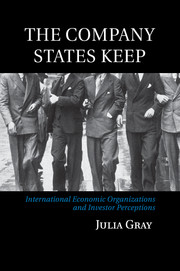Book contents
- Frontmatter
- Contents
- List of Figures
- List of Tables
- Acknowledgments
- 1 Introduction: The Company You Keep
- 2 International Institutions and Sovereign Risk
- 3 The Company You Keep in Comparative Perspective
- 4 The Effects of Good Company
- 5 When Emerging Markets Join Up with Bad Company
- 6 How Risk for Core Members Changes on IO Expansion
- 7 Conclusion
- Bibliography
- Index
2 - International Institutions and Sovereign Risk
Published online by Cambridge University Press: 05 October 2013
- Frontmatter
- Contents
- List of Figures
- List of Tables
- Acknowledgments
- 1 Introduction: The Company You Keep
- 2 International Institutions and Sovereign Risk
- 3 The Company You Keep in Comparative Perspective
- 4 The Effects of Good Company
- 5 When Emerging Markets Join Up with Bad Company
- 6 How Risk for Core Members Changes on IO Expansion
- 7 Conclusion
- Bibliography
- Index
Summary
Turkey has long been an important member of several prestigious international organizations; it was one of the first members of NATO, and has long been included in the Organization for Economic Cooperation and Development (OECD). On the multilateral stage, it joined the UN at its inception in 1945 and the GATT in 1951, and it was a founding member of the Council of Europe in 1949. Yet why did investors demand an extra premium to hold Turkish debt after its 1985 formation of the Economic Cooperation Organization with Iran and Pakistan? And why is the holdup of its negotiations with the European Union such a cause for concern among portfolio investors – particularly given the country already has a customs union with the EU in place since 1995 and already undertook significant economic liberalization (under the stewardship of the IMF) in 2001?
This chapter lays out a theory of how membership in international trade agreements ought to matter to markets. What causes investors to take countries more seriously if they are members of good clubs, or less seriously if they are members of bad clubs? Formally, why might a separating equilibrium prevail, in which different types of organizations engender different reactions, instead of a pooling equilibrium, where membership in different types of organizations invokes the same response from investors? In high-uncertainty environments, traders look to clear signals of a country's likelihood of default.
- Type
- Chapter
- Information
- The Company States KeepInternational Economic Organizations and Investor Perceptions, pp. 16 - 50Publisher: Cambridge University PressPrint publication year: 2013



